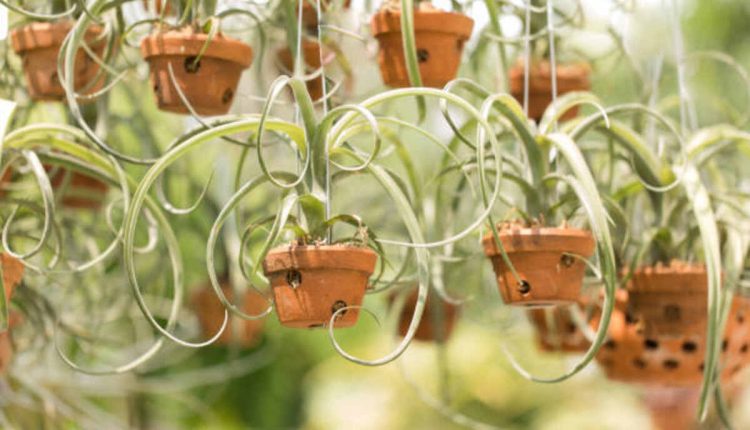Dracaena plants are generally well adapted to indoor growing, as their low light requirements make them suitable for growing inside. Furthermore, this species’ tolerance of temperature fluctuations and water needs makes it ideal for growth both inside the house and out in nature.
Socotra dracaena variety for outdoor cultivation resembles an enormous mushroom with its dense cluster of tight-knit branches arranged into an intricate dome shape with tightly packed, curved blades.
Bamboo Dracaena
Bamboo Dracaenas come in various shapes, sizes, and styles that suit multiple environments and decor preferences. You may purchase them as decorative planters with water and rocks inside for ease of care or planted directly in soil for greater resilience. They’re easy to care for, making them one of the most popular houseplants available – straight, twisted, or braided sets can even be purchased to form pyramids shaped like Christmas trees – plus you can even grow one in a hanging pot!
Though commonly sold as bamboo plants, these dracaenas belong to the asparagus family (Asparagaceae). While natural bamboo might be challenging to keep alive indoors, dracaenas do the trick perfectly well.
Dracaena sanderiana, more commonly known as lucky bamboo, was discovered on an expedition to Cameroon by Johannes M. Braun in 1779, who collected many different Dracaena species, including this now-famous random bamboo variety, and sold some to Henry Frederick Conrad Sander, who gave them their namesake designations.
Lucky bamboo originated only in China and Central Africa. Native to a region called “wet tropical biome” — meaning rainforest undergrowth — this species provides more accessible care than its bamboo cousin found worldwide in dry environments.
Lucky bamboo requires average warmth and plenty of light, whether in a planter or soil. Direct sunlight will quickly scorch it and yellow its leaves, while regular irrigation with moderately diluted liquid houseplant fertilizer should suffice in wintertime.
Limelight Dracaena
Limelight Dracaena is an attractive indoor plant with lush lime-green leaves striped in yellow that makes an eye-catching statement in any space. It is easy to care for and tolerate low light conditions, but its popularity remains undiminished today. If your Dracaena begins looking brownish-grey over time, switching out tap water for filtered or distilled water could help prevent mealybug infestation, which can cause discoloration of its leaves, resulting in further mealybug infestation.
Lemon Surprise dracaena makes for an eye-catching indoor houseplant featuring whorls of yellow and lime green leaves in whorls. Hardy yet fast-growing, it can reach heights up to six feet indoors; regular fertilization with general-purpose houseplant fertilizer should aid its development.
If you want to propagate a Limelight Dracaena, take cuttings at least 6 inches long from its mother plant and root them in water or soil in a pot until roots appear. After roots appear, transfer to its bank.
Dracaena plants are generally straightforward, though you will require ample lighting and humidity levels. As these plants can become susceptible to mealybug infestation, it’s also wise to monitor for mealybug activity regularly and treat any infested areas immediately. One common issue related to overwatering can lead to leaves becoming waterlogged, resulting in brown tips shriveling off and brown tips appearing at their ends; so to prevent this, you should water regularly but not too frequently.
Janet Craig Compacta
This tropical houseplant is a popular indoor houseplant due to its ease of care and low light needs, adding vibrant color. It grows densely with twisted stems for narrow spaces. Furthermore, its creamy white variegation at the borders nicely complements its dark green color. It makes this variety easily distinguishable from Art Carmen and Dorado varieties with their larger leaves and larger size.
The Janet Craig Dracaena is a slow-growing plant that can reach six feet tall. With dense foliage that makes it suitable for smaller spaces like living rooms or bedrooms, its low light conditions tolerance and reduced water needs make this variety ideal. It is commonly found in greenhouses worldwide and is excellent as an indoor plant!
Lemon Lime Dracaenas make an attractive indoor plant with a cheerful appearance and easy care requirements. Their leaves feature yellow-green tones in a rosette pattern around their stem. This variety tolerates shade as well as low light levels for optimal care.
Air layering is a straightforward method for propagating dracaena plants. Cut off at least a 1-inch piece of stem, fill its notch with moistened sphagnum moss, wrap tightly, place in the water container, and wait until roots have grown out. After your root ball matures, you can transplant it into another pot.
Dracaena trifasciata
Dracaena trifasciata, commonly known as snake plant or mother-in-law’s tongue, is an excellent houseplant choice in darker spaces. With its tall architectural and symmetrical form, this houseplant makes for ideal corner areas within homes or offices; its air-purifying capabilities also make it popular as a bedroom plant!
As with other dracaena species, this variety can withstand various humidity conditions. It thrives in humid and drier environments when watering is adjusted according to humidity levels in its territory; however, the soil must drain well to avoid root rot.
The snake plant is an increasingly popular aquarium and terrarium foreground plant, thanks to its vibrant green hue and ability to thrive in partial or complete submersion water environments. Not only is this versatile plant beautiful to look at, but it can also remove excess nutrients while outcompeting unwanted algae in brackish water aquariums and terrariums; plus, it can grow alone or with other rooted plants!










